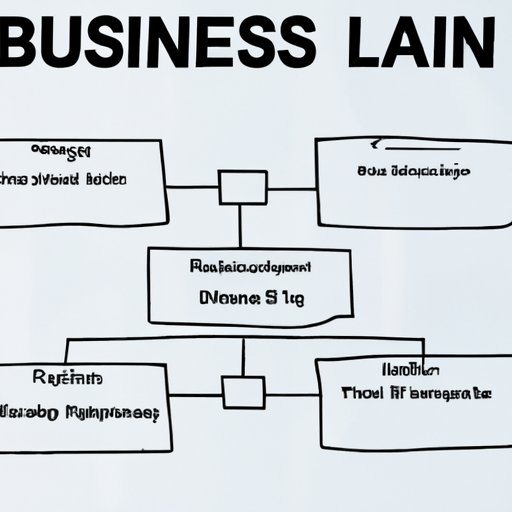I. Introduction
For anyone with a passion for baking, starting a bakery business can be a fulfilling way to make a living. With the right combination of planning, hard work, and determination, you can turn your baking dreams into a successful reality. Keep reading to learn how to start a bakery business.

A. Definition of Starting a Bakery Business
A bakery business is an establishment that produces and sells baked goods such as cakes, pastries, breads, and other items. The goal of a bakery business is to provide customers with delicious, high-quality products at reasonable prices. To achieve this, bakers must be knowledgeable about baking techniques, ingredients, and food safety regulations.
B. Overview of the Steps Involved
Starting a bakery requires a significant amount of planning, preparation, and dedication. While the process may seem daunting, it can be broken down into smaller steps. The following are some of the key steps involved in starting a bakery business:
- Outlining your business plan
- Securing funding
- Finding a suitable location
- Obtaining licensing and permits
- Investing in necessary equipment

II. Outline Your Business Plan
Creating a comprehensive business plan is essential for any business, including a bakery. A business plan will help you define your goals, research your market, and establish a budget. It will also serve as a guide for making decisions and staying organized throughout the startup process.
A. Define Your Goals
Before you begin outlining your business plan, take some time to think about your goals for your bakery. Consider what type of baked goods you want to offer, who your target customers are, and what your long-term vision is for your business. This will help you create a plan that is tailored to your specific needs.
B. Research Your Market
Once you’ve identified your goals, it’s time to do some research. You should look into the local competition and get an understanding of the trends in the industry. Additionally, you should consider factors such as pricing, customer demand, and potential growth opportunities. This research will give you a better idea of what it takes to be successful in the bakery business.
C. Establish Your Budget
Your business plan should include a detailed budget outlining all of your expected expenses. This should include costs associated with leasing a space, purchasing equipment, obtaining licenses and permits, and hiring staff. Additionally, you should factor in the cost of materials, ingredients, and supplies. Having a clear budget will help you stay on track throughout the startup process.
III. Secure Funding
Once you know how much money you need to start your business, you can begin looking for funding options. Depending on your situation, you may be able to secure funding through grants, loans, or crowdfunding platforms.

A. Consider Local Grant Opportunities
Many cities and states have grant programs specifically designed to help small businesses. These grants are typically awarded based on the merit of the proposal, so be sure to submit a compelling application. Additionally, you should check with local banks and credit unions to see if they offer any grants or low-interest loans.
B. Look into Small Business Loans
If you can’t qualify for a grant, you may want to consider applying for a small business loan. Banks and other lenders usually have special loan programs for startups. Be sure to shop around for the best rates and terms.
C. Utilize Crowdfunding Platforms
Crowdfunding platforms like Kickstarter and Indiegogo allow entrepreneurs to raise funds by asking for donations from the public. If you choose to use a crowdfunding platform, you should be prepared to share your story, set up rewards for donors, and promote your campaign on social media.
IV. Find a Suitable Location
Once you’ve secured the necessary funding, it’s time to find a suitable location for your bakery. When evaluating potential locations, you should consider factors such as visibility, accessibility, parking, and lease terms.

A. Consider Visibility and Accessibility
When selecting a location, it’s important to choose one that is visible and easily accessible. The more visible your bakery is, the more likely it is to draw in customers. Additionally, you should make sure the location is close to public transportation and major highways.
B. Evaluate Lease Terms
Before signing a lease, you should carefully review the terms. Make sure you understand all of the details, such as rental fees, length of the lease, and any restrictions. Additionally, you should ask the landlord if there are any improvements needed before you move in.
V. Obtain Licensing and Permits
In order to legally operate your bakery, you must obtain the necessary licenses and permits. These vary depending on your location, so it’s important to check with your state and local government to determine the requirements.
A. Check State and Local Requirements
You should start by checking with your state government to see what licenses and permits you need to legally operate a bakery. Additionally, you should contact your local city or county government to ensure you meet all of their requirements.
B. Secure Food Preparation and Selling Licenses
Depending on the size and scope of your business, you may need to obtain a food preparation license and/or a food selling license. These licenses typically require a fee and periodic inspections, so you should familiarize yourself with the regulations in your area.
VI. Invest in Necessary Equipment
Once you’ve obtained the necessary licenses and permits, you can begin investing in the necessary equipment for your bakery. You should make a list of all the items you need, such as ovens, mixers, refrigerators, and baking pans. Additionally, you should consider purchasing used equipment to save money.
A. Identify Your Needs
Before buying any equipment, you should first identify your needs. Consider the type of baked goods you plan to offer and the scale of your operation. This will help you determine the types of equipment you need and the quantity of each item.
B. Consider Used Options
Buying used equipment can be a great way to save money when starting a bakery. Look for reliable brands that provide good quality at an affordable price. Additionally, you should make sure the equipment is in good working condition before making a purchase.
VII. Conclusion
Starting a bakery business can be an exciting and rewarding venture. By outlining your business plan, securing funding, finding a suitable location, obtaining licensing and permits, and investing in necessary equipment, you can turn your baking dreams into a reality. With the right combination of planning, hard work, and determination, you can become a successful bakery owner.
of Key Points
Starting a bakery business involves outlining a business plan, securing funding, finding a location, obtaining licenses and permits, and investing in necessary equipment. Additionally, you should research the market and establish a budget to ensure success.

B. Encouragement to Take Action
If you’re passionate about baking and have the drive to succeed, you can make your bakery dreams come true. Take the first step today and start planning your business. With dedication and hard work, you can become a successful bakery owner.
(Note: Is this article not meeting your expectations? Do you have knowledge or insights to share? Unlock new opportunities and expand your reach by joining our authors team. Click Registration to join us and share your expertise with our readers.)
